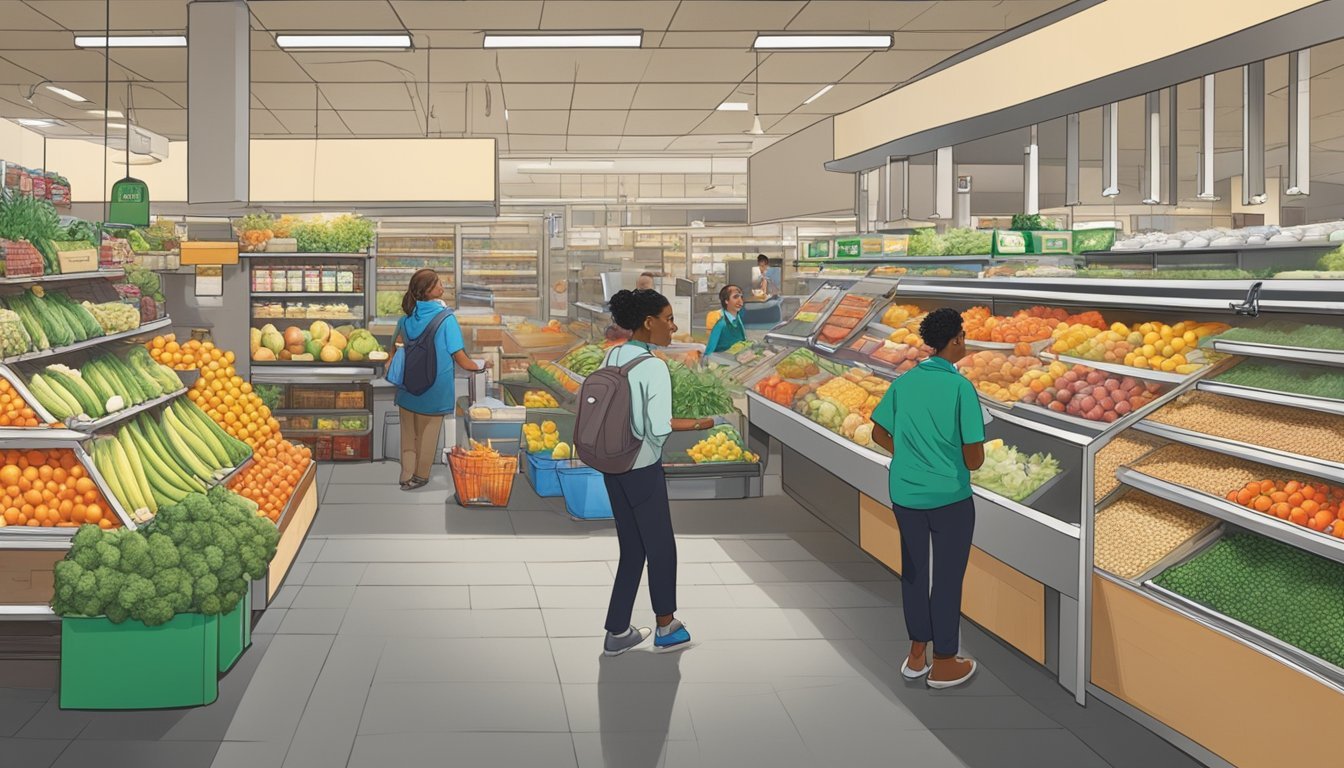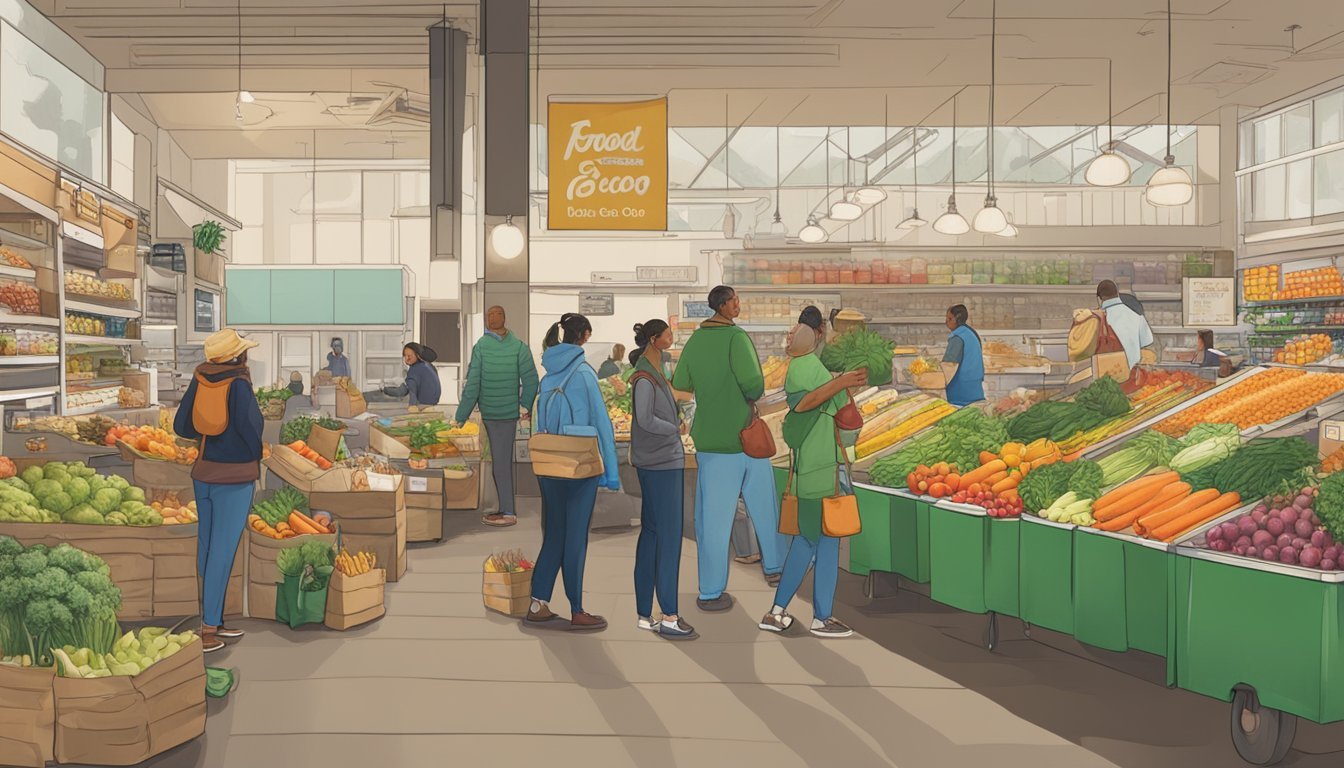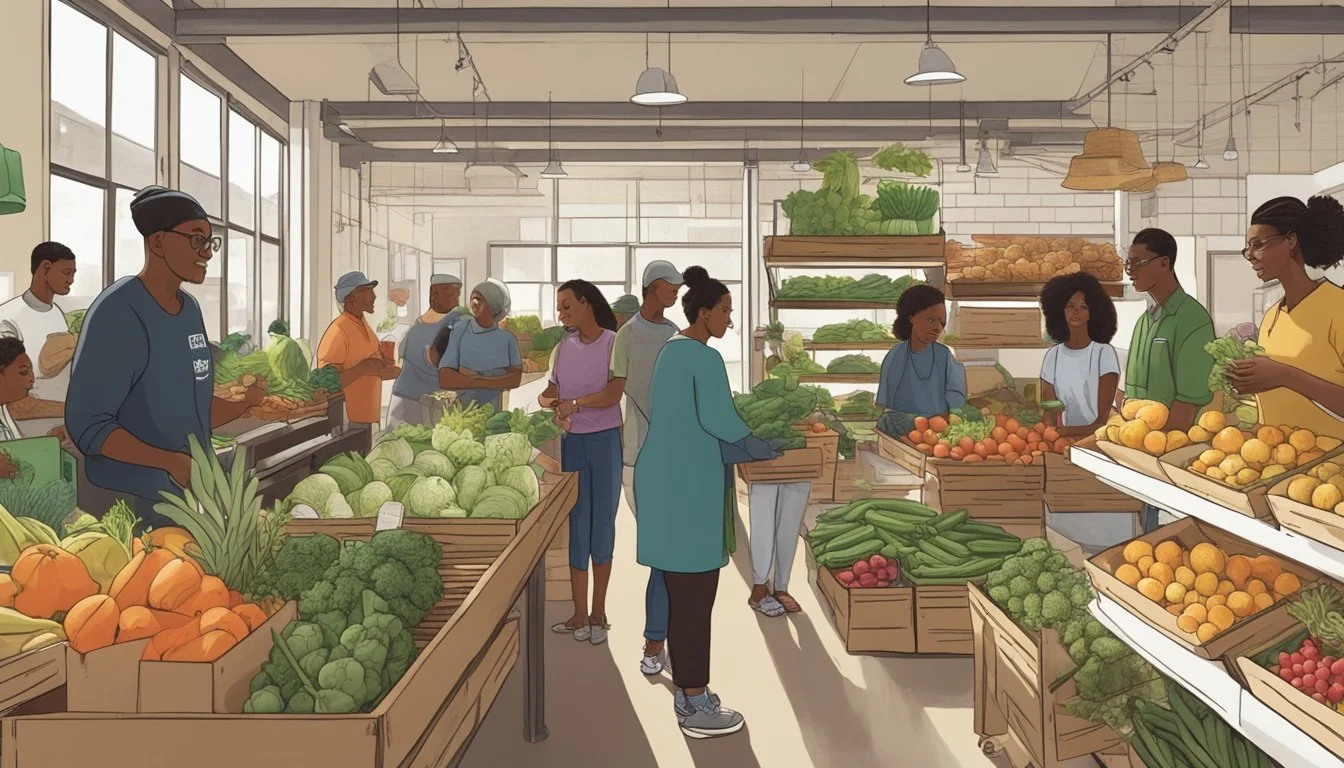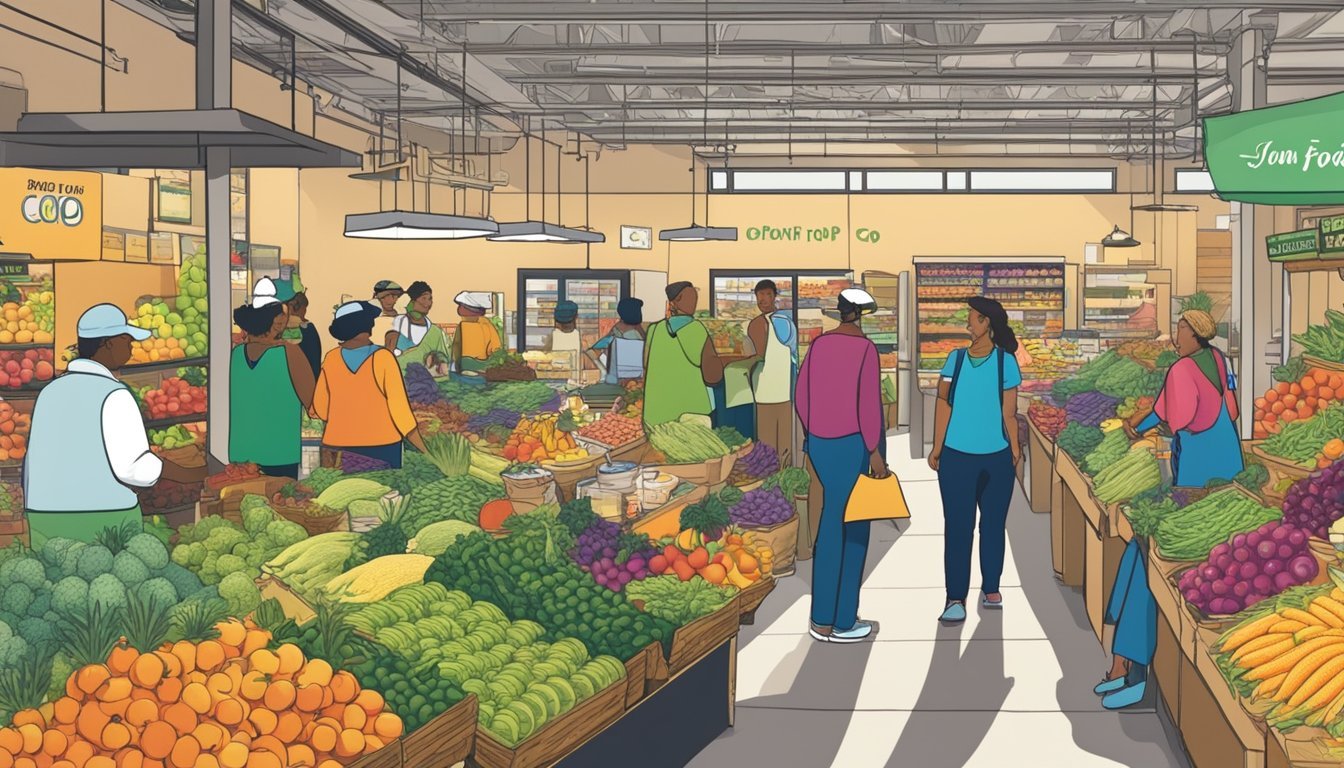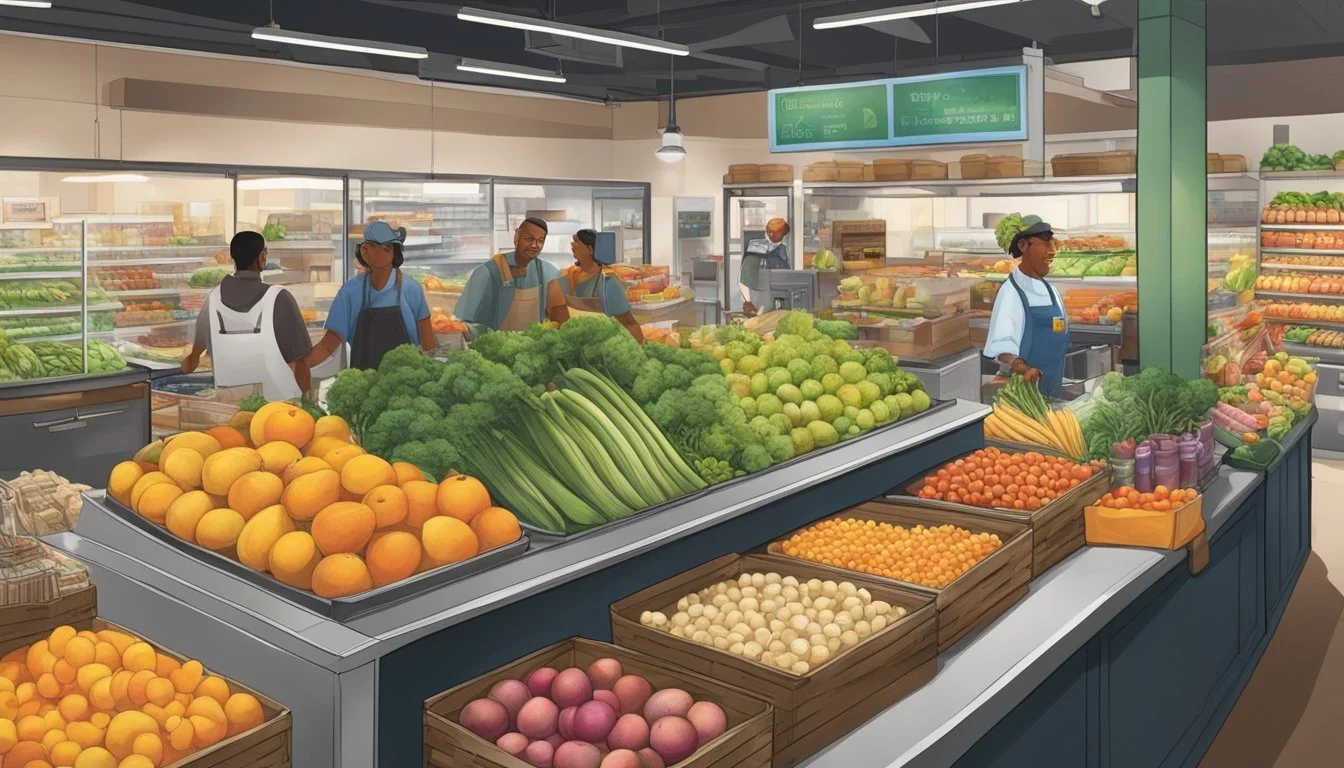Guide to Food Co-Ops in Yonkers, NY
Your Path to Local, Sustainable Groceries
In Yonkers, New York, the community-oriented spirit is tangible through its local food co-ops. These cooperative grocery establishments are more than just places to buy food; they are a testament to the communal commitment to accessibility, sustainability, and shared prosperity. Each co-op is underpinned by its members' dedication to providing wholesome, organically sourced food options. From their inception in the humble beginnings of grassroots movements, like that of the Flatbush Food Co-op, these cooperatives have grown to be integral parts of their neighborhoods.
The food co-ops in Yonkers reflect a diverse tapestry of food justice and sustainable agricultural practices. They aim to empower residents with not only the choice to purchase locally grown, fresh produce but also the opportunity to participate in a local food system. The interconnectedness of food co-ops with local farmers and producers underscores a thriving ecosystem of nutrition, health, and community engagement.
Groundwork Hudson Valley's initiative, the Get Fresh Yonkers Farm Co-Op, exemplifies how urban environments can effectively integrate agricultural spaces to benefit city dwellers. Similarly, initiatives like food pantries dovetail with these co-ops to address food access and security, ensuring that all members of the community have opportunities to enjoy fresh, nutritious food. Through these collaborative efforts, Yonkers has methodically laid the foundation for a resilient local food network that prioritizes both individual well-being and communal enrichment.
What is a Food Co-Op?
A food co-op, also known as a food cooperative, is a model where consumers come together to create a grocery resource that is collectively owned and controlled by its members. In this setup, the community is at the heart of the operation, with decisions made democratically to meet the shared needs of its members, rather than prioritizing external investors.
Key Characteristics of Food Co-Ops:
Member-Owned: They are owned by the community members who shop there, which means they have a say in the business decisions and benefits like sharing in the profits.
Community Focused: They reinvest profits into local communities, support local producers, and often provide better prices for quality goods, which fosters local economic growth.
Product Selection: Food co-ops typically offer a range of products, from staple groceries to organic and natural foods, often emphasizing quality and sustainability.
Structure of Co-Ops:
Governance is democratic, often one member gets one vote, regardless of how much they have spent.
Members can participate in policy development and in some cases, volunteer in the co-op.
Food co-ops in Yonkers, NY, would provide a platform for consumers to access groceries that align with their values, support their local economy, and contribute to a sustainable food system. As a cooperative, it encourages a healthy connection between consumers, their food, and their neighbors.
Benefits of Joining a Food Co-Op
Joining a food co-op in Yonkers, NY offers tangible benefits across economic, health, and community spheres. It's a conscientious choice that aligns personal well-being with community enrichment.
Economic Advantages
Support for Local Economy: A co-op keeps money circulating within Yonkers by prioritizing local producers and suppliers. It's an investment in the community's economic health and resilience.
Member Savings: Co-op members often enjoy reduced prices on high-quality goods, thanks to the cooperative’s unique ownership structure and profit distribution strategies.
Health and Quality of Life
Access to Organic and Healthy Options: Co-ops typically offer a range of organic, non-GMO, and fresh local produce that supports a healthier lifestyle.
Educational Resources: Many co-ops provide educational materials and workshops on nutrition and sustainable living, empowering consumers with knowledge to make healthier choices.
Social and Community Impact
Democratic Participation: Members have an equal say in co-op decisions, fostering a sense of agency over one's consumer choices and community involvement.
Community Building: Co-ops often become hubs for local activities, connecting members with their neighbors and strengthening communal bonds.
Food co-ops serve as an intersection for individuals to support and engage in a more sustainable and locally-focused food system. They exemplify how conscious consumer choices contribute to broader societal benefits.
How to Join a Food Co-Op
Joining a food co-op in Yonkers, NY involves understanding the specific membership requirements and financial contributions necessary for membership. The process reflects a commitment to community building and sustainable consumer practices.
Membership Requirements
Co-ops typically require potential members to agree to uphold the cooperative's values and participate in its community-oriented initiatives. Here is a brief overview of the usual requirements:
Residency: Applicants often need to be local residents.
Participation: Some co-ops ask members to contribute time in operations.
Agreement: Members must agree to the cooperative principles and bylaws.
Fees and Contributions
The financial aspect of joining a food co-op includes a few different types of fees and contributions:
Join Fee: A one-time fee to initiate the membership process. For instance, a co-op might charge a $5 join fee.
Capital Investment: Members might pay a refundable capital investment, which can be a fixed amount, such as $100.
Membership Fee: Annual or monthly fees, which could range from $60 to $72 per year, are sometimes required.
Membership confers benefits such as discounts on sales and may follow a tiered structure based on contribution levels. Each co-op has specific terms for their fees and return policies.
List of Food Co-Ops in Yonkers, NY
The city of Yonkers, nestled in the state of New York, offers various food co-operatives known for their commitment to providing community members with access to wholesome, organic food options. Food co-ops are a popular alternative to conventional grocery stores, often operating as member-owned and governed retail establishments.
Grow It Green Morristown Urban Farm CSA
Location: Morristown, NJ (near Yonkers)
Notable for: Community-run agriculture emphasizing sustainable practices.Flatbush Food Co-op
Founded: 1976
Location: Nearby Brooklyn area
Notable for: An evolved co-op from a small community collective to a large provider of organic food.Neighboring Food Co-op Association (NFCA) Members Although not located directly within Yonkers, several NY-based co-ops are affiliated with the NFCA. Collectively, they represent a significant force in the local food market:
Member-Owned Count: 24,735+
Employment Provided: 255+
Annual Revenue: $44.4 million
Local Products Sold: $8.7 million
Local Real Estate Impact: Operate 6 storefronts
While this list isn't exhaustive, these food co-ops are indicative of the thriving community-centric food market in and around Yonkers, NY. Residents have opportunities to partake in these cooperative ventures, either as members or customers, which not only contribute to a healthier lifestyle but also positively impact local real estate by supporting and utilizing storefronts that might otherwise be vacant.
Understanding Co-Op Finances
Managing finances in a Food Co-Op involves understanding the cooperative's structure of fees and the economic participation required by its members. This financial framework ensures the Co-Op’s sustainability and ability to serve its consumers effectively.
Fee Structures
When individuals join a Food Co-Op in Yonkers, NY, they are typically required to pay membership fees. These fees contribute to the operating costs of the Co-Op and can vary depending on the type of membership and services provided. It is crucial to note that a Food Co-Op can have different fee structures, such as:
Annual Membership Fee: A yearly charge that members pay for the maintenance and development of the Co-Op.
Monthly Fees: Some Co-Ops may charge monthly fees instead of or in addition to annual fees to cover ongoing costs.
Equity Investment: Members might also invest in the Co-Op by purchasing shares, which represent their part ownership and commitment to the cooperative.
Economic Participation
Members of a Food Co-Op engage in economic participation by:
Purchasing Goods: Shoppers support the Co-Op financially through the sale of goods. Each purchase contributes to the Co-Op's revenue and sustainability.
Patronage Dividends: In profitable years, a Co-Op might return a portion of the profits to its members based on their purchases, representing the members' share of the Co-Op's success.
Through transparent and fair financial practices, Food Co-Ops in Yonkers, NY, align the interests of their consumer base with the ongoing viability of the cooperative, creating a mutually beneficial ecosystem.
Legal and Organizational Structure of a Co-Op
A cooperative, or co-op, is a business organization that's democratically controlled by its members, who actively participate in setting policies and making decisions. The legal and organizational structure of a food co-op in Yonkers, NY, emphasizes shared ownership and operation for mutual benefit.
Legal Framework: In Yonkers, as in other parts of New York, food co-ops may be organized under several legal structures:
Incorporated Co-ops: Recognized as a distinct legal entity, offering liability protection to its members.
LLCs: A Limited Liability Company can function as a co-op, known for flexibility in management and profits distribution.
Unincorporated Associations: Some small co-ops choose this informal setup, which might not offer the same level of legal protection as incorporation.
Organizational Hierarchy: The organization of a co-op typically involves several key components:
Board of Directors: Elected by members, the board oversees larger decisions and sets strategies.
Management Team: Appointed by the board, the team handles the day-to-day operations of the co-op.
General Membership: Co-op members have the right to vote on important matters and influence the direction of the organization.
Key Entities:
Consumer: Consumers can become co-op members to enjoy benefits such as product discounts and a say in co-op matters.
Co-Op: The co-op in Yonkers serves the community by providing access to food products, often focusing on local and sustainable sources.
Brooklyn: As a reference for comparison, many cooperatives in nearby Brooklyn offer insights on effective practices that could be replicated or adapted in Yonkers.
Supporting Local Agriculture
Food co-ops in Yonkers play an integral role in supporting local agriculture, ensuring that residents have access to fresh, organically grown produce, while simultaneously bolstering the regional food economy.
Regional Farmers and Producers
Local farmers and producers are central to the success of food co-ops in the Yonkers area. By prioritizing produce grown within the region, co-ops help to sustain the agricultural community, each transaction strengthening the local ecosystem. Participating co-ops offer a variety of below-market-priced organic fruits, vegetables, dairy, and other products, enhancing the availability and affordability of high-quality produce for consumers in the region.
LocalHarvest: Highlights co-ops that sell locally grown produce.
Get Fresh Yonkers Farm Co-Op: Provides organically grown produce within Yonkers.
Community Supported Agriculture (CSA)
Community Supported Agriculture (CSA) is a significant subsection of the local food movement, where community members invest in local farm operations. The Briarwood CSA in Queens, NY, established in 2019, exemplifies this initiative by offering shares of the harvest to local consumers.
Briarwood CSA: Founded in 2019 in Queens, NY, offering shares of locally grown produce to community members.
These agricultural initiatives foster a connection between the community and regional producers, with benefits such as job creation, food security, and support for small-scale farmers. They exemplify how food co-ops can serve as a lifeline for local agriculture.
Educational Resources and Events
Food co-operatives in Yonkers, NY, offer much more than just a place to shop for locally sourced items. They serve as educational hubs where consumers and community members can learn about nutrition, sustainable agriculture, and the impact of local food systems. These co-ops often host events and workshops geared towards enhancing the knowledge of their members and the general public.
Workshops and Classes: Most co-ops offer a range of classes which may include:
Cooking Demonstrations: Learn how to prepare healthy meals using organic products.
Sustainability Talks: Understand the importance of eco-friendly practices in food production.
Seasonal Food Education: Discover how to select and utilize seasonal produce.
Community Events:
Co-op Meetups: Regular meetings to discuss co-op development, share ideas, and network.
Local Farm Tours: Organized visits to nearby farms to see where and how the food is grown.
Volunteer Opportunities: Engage directly by volunteering, fostering a deeper connection with the food and the people who produce it.
Newsletters and Bulletins: Most co-ops distribute newsletters, providing:
Up-to-date information on upcoming events
Highlights of new, seasonal, or featured items
Tips and recipes for healthy living
By offering these resources, co-ops in Yonkers aim to empower individuals to make informed decisions, encourage participation in the local food economy, and support the sustainability of their communities.
Comparing Co-Ops to Traditional Grocery Stores
When exploring Yonkers, NY's food landscape, discerning shoppers will notice distinct differences between food co-ops and traditional grocery stores in areas such as product selection, pricing strategies, and foundational business models.
Product Selection
Traditional grocery stores typically offer a wide range of national brands across various categories, from produce to packaged goods. These stores prioritize stocking items that have a high turnover rate to maximize profits. In contrast, food co-ops often lean towards a curated selection with an emphasis on local, organic, and sustainably-sourced goods. This means while the product range may be narrower, the items reflect community values and support local producers.
Price Comparison
Prices at co-ops might be perceived as higher due to the quality of goods and their sourced nature. However, co-ops sometimes provide member discounts and benefits that offset these costs. Grocery stores compete heavily on price, often using loss leaders—a practice where certain items are sold at a loss to draw customers in—with the goal to sell high-volume, lower-margin products.
Item Type Co-op Pricing Strategy Traditional Grocery Store Pricing Strategy Organic Produce Higher, but with discounts for members Competitively lower, but less variety Bulk Items Prices may be lower due to minimal packaging Varies, often discounted to clear stock National Brand Packaged Goods Less focus, can be more expensive Often lower due to bulk buying power
Business Models
Co-ops operate on a shared equity model where customers and workers can become members, investing money and/or time in exchange for a stake in the business. Sales in co-ops go beyond just revenue; they strengthen community bonds and reinvest in local ecosystems. Traditional grocery stores are typically investor-driven, prioritizing shareholder interests and operating on a profit-maximization model. Revenue primarily cycles back to corporate stakeholders, not necessarily the local community.
Navigating Challenges and Controversies
Food co-ops play an essential role in offering quality food and fostering community ownership. However, they encounter various difficulties that need careful management strategies.
Economic Challenges
Co-ops face economic pressures from large-scale competitors, often challenging their financial sustainability. Consumers may find co-op prices higher in some instances due to their smaller economies of scale and commitment to fair trade and local products. Financial mismanagement can also lead to disputes among members concerning the allocation of resources or investment decisions.
Product Availability Issues
Product selection is another contentious area. While co-ops prioritize locally sourced and organic items, inconsistencies in supply can lead to shortages, impacting consumer satisfaction. The co-op must balance member expectations for variety with its commitment to ethical sourcing practices.
Membership Disputes
Membership in a co-op comes with rights and responsibilities. Sometimes, disputes arise over policy decisions, member contributions, or the direction of the co-op. Ensuring transparent governance processes and clear communication is crucial to mitigate such conflicts and maintain member trust.
Future of Food Co-Ops
The landscape of food co-operatives (co-ops) in Yonkers, NY, is poised for innovative expansion and community-driven growth, reflecting broader trends and the evolving needs of consumers.
Trends and Innovations
Food co-ops are increasingly adopting inclusive business practices and focusing on sustainability. One trend is the commitment to Inclusive Trade programs, which support products from diverse companies. These programs emphasize goods from enterprises owned by historically underrepresented groups such as women, people of color, LGBTQIA+ individuals, veterans, or people with disabilities. Technological innovations are another area of focus, with co-ops investing in efficient supply chain systems, online shopping platforms, and inventory management tools tailored for grocery items.
Community Impact and Growth
The growth of food co-ops in Yonkers reflects their significant impact on local communities. A surge in consumer interest in organic and health food options has led to expansions of existing stores. Co-ops like the Get Fresh Yonkers Farm Co-Op enhance access to organically grown produce, improving the dietary choices available to residents. Employment opportunities also rise as these co-ops grow, benefiting not just consumers and communities but also local economies. Co-ops are becoming interwoven with social and economic development, moving beyond pure retail to a movement that addresses social inequity and food accessibility.

